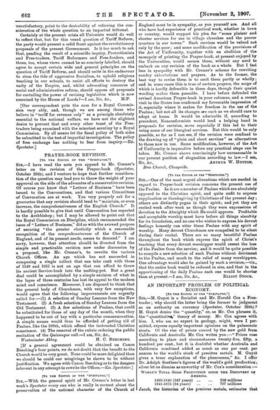PRAYER-BOOK REVISION.
[To yes EDITOR Or TRH monk-roam SIR,—I have read the note you append to Mr. Cremer's letter on the revision of the Prayer-book (Spectator, October 26th), and I venture to hope that further considera- tion of the question may lead you to throw the weight of your approval on the side of the advocates of a conservative revision. Of course you know that "Letters of Business" have been issued to the Convocations, and that various Committees of Convocation are at work. You very properly ask for a guarantee that any revision should tend to "maintain, or even increase, the comprehensiveness of the English Church." It is hardly possible to give that until Convocation has reported to the Archbishop ; but I may be allowed to point out that the Royal Commission on Discipline, which recommended the issue of "Letters of Business," did so with the avowed purpose of securing "the greater elasticity which a reasonable recognition of the comprehensiveness of the Church of England, and of its present needs, seems to demand." I am sorry, however, that attention should be diverted from the simple and practicable revision now under discussion by a proposal, like Mr. Cremer's, to rewrite the various Church Offices. An age which has not succeeded in composing a single collect that can take rank with those of 1549 and 1661 is not an age that can afford to throw its ancient Service-book into the melting-pot. But a great deal could be accomplished by a simple excision of what in the lapse of three centuries has lost its appeal to the modern mind and conscience. Moreover, I am disposed to think that the general body of Churchmen, with very few exceptions, would agree that the following improvements are urgently called for :—(1) A selection of Sunday Lessons from the New Testament. (2) A fresh selection of Sunday Lessons from the Old Testament. (3) A few selections of Psalms, that could be substituted for those of any day of the month, when they happened to be out of key with a particular commemoration. A simple means would thus be afforded of getting rid of Psalms, like the 109th, which offend the instructed Christian conscience. (4) The removal of the rubric ordering the public recitation of the Quicunque vult.—I am, Sir, &c., [If a general agreement could be obtained on Canon Beeching's four points, we do not doubt that the benefit to the Church would be very great. None could be more delighted than we should be could our misgivings be shown to be without justification. We agree with Canon Beeching as to the dangers inherent in any attempt to rewrite the Offices.—E. Spectator.]






























































 Previous page
Previous page